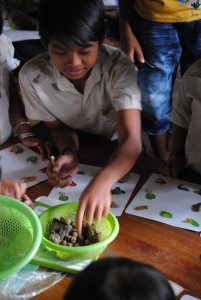 The Improved Basic Education in Cambodia project (IBEC) was a major education development project supported by USAID during the period of 2009-2014, with a budget of $10 million. The project was implemented by World Education as the prime contractor and included strong cooperation with civil society partners and government. The project lasted five years and had an IBEC was characterized by an integrated design that provided support to over 300 schools in Kampong Cham, Siem Reap, and Kratie provices.
The Improved Basic Education in Cambodia project (IBEC) was a major education development project supported by USAID during the period of 2009-2014, with a budget of $10 million. The project was implemented by World Education as the prime contractor and included strong cooperation with civil society partners and government. The project lasted five years and had an IBEC was characterized by an integrated design that provided support to over 300 schools in Kampong Cham, Siem Reap, and Kratie provices.
IBEC led to improvements in educational access, quality, and relevance, along four components:
- Local NGO/Government Capacity Building and Advocacy for Sustainability;
- More Equitable School Access (Subcomponents included Scholarships and School Grants);
- Improved School Management and Community Engagement; and
- Educational Relevance (Subcomponents included Workforce Development through Life Skills Education, Educational Innovation for Science & Technology, and Teacher Education).
Key results of IBEC are summarized below:
- Provided enhanced educational services to 136,383 students (49.5% female) of which 81,024 were primary school students and 55,359 were secondary school students.
- Constructed 32 classrooms and repaired 716 classrooms.
- Provided 141,043 people with access to improved drinking water supplies and sanitation facilities in 300 schools.
- Trained 553 school administrators/officials.
- Trained 1,904 (829 female) secondary school teachers.
- Supported 292 Parent Teacher Associations and similar governance structures.
- Improved management information systems in 292 institutions
- Printed and distributed 232,860 textbooks and other teaching and learning materials.
- Provided scholarships to 7,438 (4,246 female) primary school children and 2,241 (1,586 female) secondary school children. 94% of primary and 83% of secondary school scholarship beneficiaries stayed in school through the end of IBEC.
- Provided 360 individuals from remote and high priority areas with scholarships to Provincial Teacher Training Colleges.
- 848 families in target schools adopted practical livelihoods activities as a result of school-community outreach.
- 26 IT labs and 24 science labs were constructed by IBEC.
- 100% of sampled schools registered enhanced reading environments through one or more of the following channels: a) storybook hour in libraries, b) reading corners in classrooms, c) use of special readers and other materials, and d) administration of formative reading tests.
- 72% of these schools achieved a minimum standard of reading on a competency test, and 87% of children with reading problems who received remedial instruction in Year 4 of IBEC were promoted.
Creating Leaders with Vision – IBEC Success Story
Star Scholar Urges Classmates to Stay in School – IBEC Success Story
